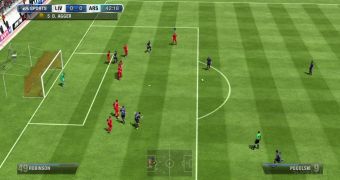One thing you could count on in FIFA 12 was the referee: sure he was unable to detect handballs as long as you didn’t make a small change in the game options, but when it came to harsh fouls, the computer-controlled match judge was delivering justice with a balanced hand.
Sure, from time to time I moaned about a yellow card that should have been red or about a penalty that was just a stronger than expected challenge, but after playing FIFA 12 almost every day for one year, I came to trust the referee and his decisions, something that’s almost unheard of when it comes to real life.
In their quest for realism, it seems that EA Sports has tweaked the referee mechanics in FIFA 13 (check out the full Softpedia review) to make them more prone to mistakes and missed calls.
I played quite a few matches where hard challenges that missed the ball entirely only received a telling off and a free kick, while small pushes near the edge of the box generated a yellow card or even the dreaded second one which led to an elimination.
I used to only worry about the movement of my defenders and about the timing of my tackles in FIFA 12, knowing that the referee would be even handed when it came to fouls and punishment.
In FIFA 13, I worry less about the tactical element of my defensive efforts and dedicate more time to evaluating how the referee might react if I choose to launch into a stronger tackle or if I try to take the ball from the opposition via less than orthodox means.
I acknowledge the fact that a referee who can make mistakes and judge situations in a partisan manner adds a new dimension of realism to FIFA 13, but I sometimes find myself yearning for the simpler times of the previous game in the series.

 14 DAY TRIAL //
14 DAY TRIAL //